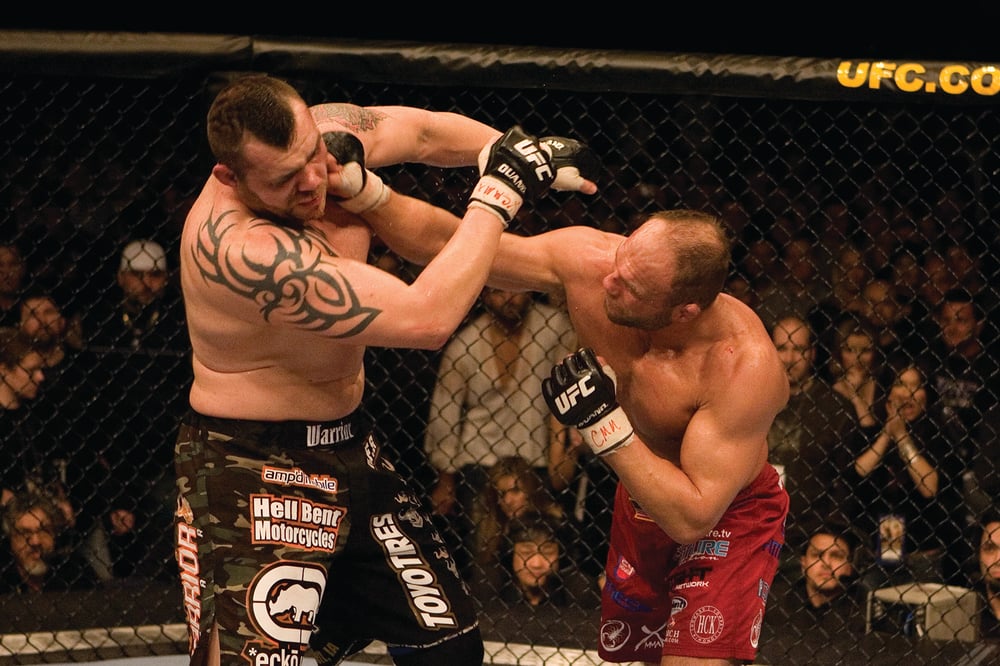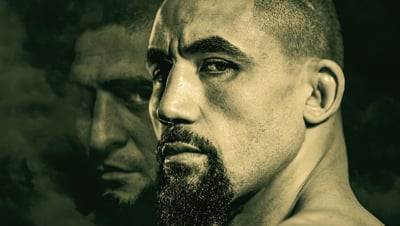
Issue 037
May 2008
The Turbulent History of the UFC Heavyweight Title
Uneasy lies the head that wears a crown, wrote William Shakespeare in Henry IV, Part Two. So it has been for the ten men who have held the UFC heavyweight championship title. The crown has refused to settle on anyone’s brow for any length of time and as it has been rapidly passed from hand to hand, the gold is starting to lose its lustre.
For over a century, the heavyweight boxing championship of the world was regarded as the single most desirable prize in sports. The heavyweight champ was the best of the best and basked in the glory of his accomplishments as an individual. The best quarterback, the best fly-half, the best batsman were all somehow diminished by the fact that they competed as members of a team, but a fighter won or lost on his own.
Sadly for boxing, the prestige of the heavyweight title lost its shine in the late 1970s when different governing bodies recognised different champions, splintering the glory of the title by having too many claimants to the throne. The last truly dominant, unified heavyweight champ in boxing was Mike Tyson, almost twenty years ago. The lack of any high profile, convincing and charismatic title holder in the top division is one of the reasons for the decline in boxing’s popularity, which in turn has played its part in the successful rise of MMA.
Since the demise of Pride, the UFC now stands as the most prestigious fighting organisation in the world and, by extension, the UFC heavyweight title should now be the most sought after accolade in the sporting world. So why is Zuffa suing Randy Couture for trying to leave the promotion while still he still reigned as champ, and what does it mean for the value of the heavyweight belt when a fighter doesn’t want it anymore?
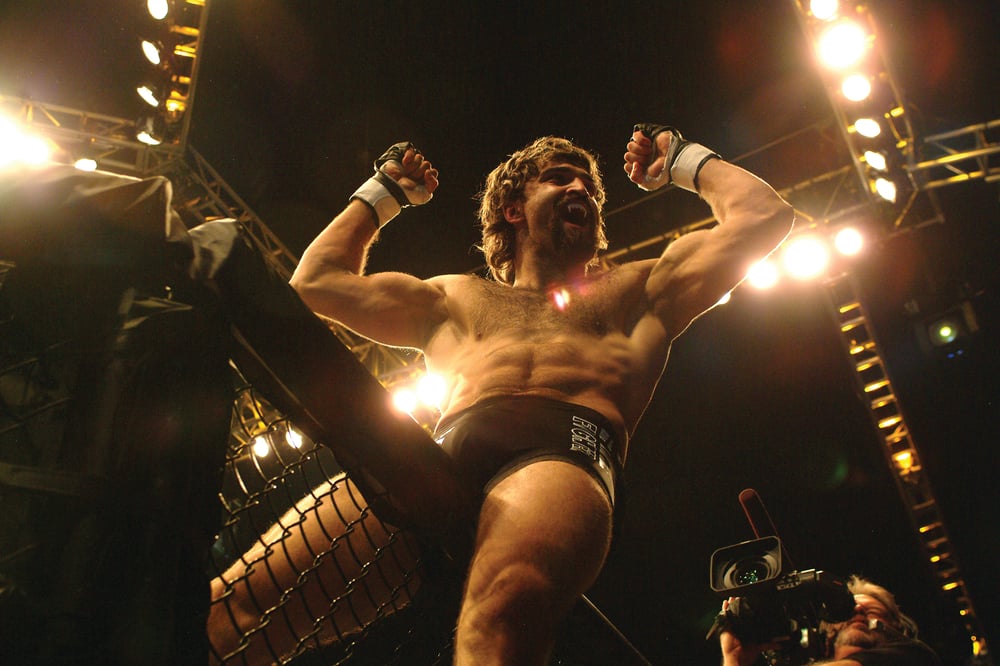
Inauguration
The UFC’s first heavyweight championship belt was awarded to Mark Coleman after he submitted Dan Severn at UFC 12. In those early days of the promotion, Coleman looked unbeatable but right from its inception the heavyweight strap proved frustratingly slippery. Coleman lost the belt in his first defence, a gruelling fight with Maurice Smith at UFC 14 that saw Coleman run out of gas after controlling Smith for nine minutes, allowing the kickboxer to get back in the fight, staggering Coleman on his feet and taking the decision win. Smith completed just one defence against late replacement Tank Abbott, who also gassed out and quit rather than take a prolonged beating from the better-conditioned champ.
At the first Ultimate Japan in December 1997, Randy Couture dethroned Smith in a hard fought majority decision, winning the title in the first of three times, but in January 1998 he was stripped of the belt during a contract dispute with the UFC. With the benefit of hindsight, it seems eerily prescient of Couture’s future relationship with the promotion. In Couture’s absence, Kevin Randleman (who had just beaten Maurice Smith) and former King Of Pancrase Bas Rutten fought for the vacant title at UFC 20, with Rutten winning a decision that is still the subject of controversy almost ten years on. In the aftermath, Rutten was planning to drop down a weight class but instead went into retirement on doctor’s orders, only returning to competition once to masterfully dismantle Ruben Villareal at WFA 4 in 2006.
Heavy Rotation
At UFC 23 Randleman won the belt many felt he should have gotten in his first attempt with a decision win over Pete Williams. He completed one defence against Pedro Rizzo before getting ground and pounded by the returning Randy Couture at UFC 28. For his second reign as heavyweight champ, Couture completed two successful defences against the persistent Pedro Rizzo, with one decision and one TKO victory, before being battered by the youthful Josh Barnett and losing the title at UFC 36.
Barnett never had the chance to defend the crown, being stripped and sent packing from the UFC after failing a post-fight drugs test. In the five years since the first heavyweight title fight, the belt had already been vacated three times and only Couture had managed more than a single successful defence. This wasn’t the way to add prestige to what should have been the UFC’s marquee division, but in the wake of Barnett’s departure the title remained as slippery as ever.
Ricco Rodriquez became the next champion by forcing Couture to verbally submit in the fifth round at UFC 39. Unfortunately, Rodriquez was knocked out in his first defence by Tim Sylvia, who made one defence against Gan McGee before a positive steroid test cost him the belt. After less than a year, Sylvia returned to fight Frank Mir for the now vacant title, losing when Mir broke his arm fifty seconds into the fight. Mir was promptly sidelined by a motorcycle crash, so Sylvia came back to fight Andrei Arlovski for the interim title, which Arlovski won by ankle lock.
With Mir unable to return, the interim title transformed into the full championship and the Belorussian managed two defences against Justin Eilers and Paul Buentello before losing to Sylvia in a rematch. Sylvia won the rubber match at UFC 61, but alienated fans in the process with a plodding five round decision. He repeated his slow but steady ways against Jeff Monson, an uninspired performance that gave Randy Couture the idea that if he came out of retirement, he could beat the physically imposing champion.
Exit Captain America
Couture was true to his word and convincingly defeated Sylvia over five rounds at UFC 68 to become the first three-time UFC heavyweight king. After a successful defence against Gabriel Gonzaga, Couture walked away from the UFC, complaining that he wasn’t receiving his due with the promotion and disappointed that Dana White had failed to sign Pride’s last heavyweight champion, Fedor Emelianenko, the number one ranked big man in the world and the only opponent Couture was interested in facing. To date, Dana White has refused to strip Couture of the title, but re-instituted the interim belt which Antonio Rodrigo ‘Minotauro’ Nogueira captured by submitting Tim Sylvia earlier this year.
In the eleven years since the introduction of the heavyweight title, no fighter has managed more than two successful consecutive defences, the belt has been left effectively vacant no less than five times and the longest title reign has been the paltry fourteen months accomplished by Arlovski. Compare that to boxing’s longest reigning heavyweight champion, the legendary Joe Louis, who won the belt on June 22nd 1937 and vacated the title for a short-lived retirement, twenty-five defences later, on March 1st, 1949. Let’s not forget that Louis’s career was interrupted by World War Two, which kept him out of the professional ring while he was in the army. Fourteen months and two title defences makes the UFC’s longest surviving titleholder look like a blip on the radar next to Louis’ accomplishments.
While it’s true that there are a lot more ways to lose in MMA than boxing, it does demonstrate that the UFC has yet to produce a heavyweight capable of dominating the division. Tim Sylvia holds the distinction for the greatest number of title fights, having participated in nine matches where the belt was on the line, yet Sylvia remains unloved by the fans at large, who perhaps expect such a gigantic monster to be less cautious in the cage.
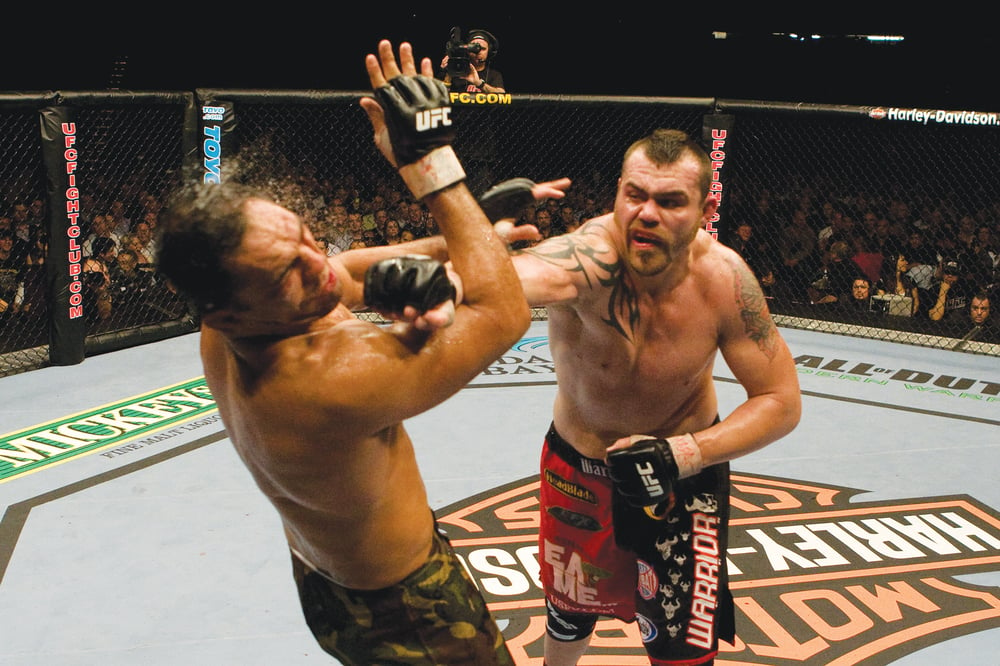
Chasing The Russian
While the interim champ Nogueira is undoubtedly one of the top heavyweights in the business, at present he is little known in the US. If Couture cannot be drawn back to the UFC, Nogueira will find his interim title transforming into the full championship, but Dana White knows that for the belt to have any legitimacy he needs Captain America. But to get Couture, first he needs Fedor. As of the time of writing, that suddenly looks like it might be within the realm
of possibility.
According to Fedor’s agent, Apy Echteld, the Russian is no longer under contract to M-1 and is now looking for a new promotion to offer him more money than the wet dreams of Midas. If Dana White can get over the fact that Fedor likes to compete in Combat Sambo tournaments when he’s not doing MMA and offer him a less restrictive contract than the one he tabled last time, he has deep enough pockets to bring him into the octagon. Once there, he’ll probably have to face Nogueira to introduce him to the American public. Having battered Nogueira in their two previous encounters (not counting the no-contest in between), that looks like a safe
bet. Interim belt in hand, Fedor could then fight Couture to unify
the titles.
Or it could all go horribly wrong for Dana White. Firstly, Couture has signed a contract with HDNet Fights that will come into effect once his current UFC contract expires (subject to Zuffa’s lawsuit). If HDNet manages to sign Fedor as well, White can wave goodbye to the biggest fight in MMA history and watch it unfold on a rival promotion.
Alternatively, he could put Couture in with Nogueira while he waits for Fedor, but stylistically that’s a risky proposition. Couture is a superb ground and pound fighter, but Nogueira is a positively deadly submission master on the canvas and it’s hard to see how Couture could avoid the Brazilian’s submissions for a five round in a championship bout, and as Tim Sylvia found out the hard way, anything short of running Nogueira over with an eighteen wheel truck won’t put him away. The guy never quits and soaks up punishment only to come back and say, “Please sir, is there any more?”
Dana White’s public attacks on Fedor haven’t helped matters, and might just be enough to push both the Russian and Captain America into the waiting arms of HDNet Fights. What makes Fedor so appealing for Couture is that in twenty-eight contests, he has only lost once, and that was on a cut. He holds wins over Heath Herring, Mirko Filipovic, Mark Hunt, Semmy Schilt, plus former UFC champs Mark Coleman (twice) and Kevin Randleman, not to mention Nogueira. He appears inhumanly imperturbable in action – Randleman slammed him on his head but an unfazed Fedor calmly tapped him out with a kimura – and generates extraordinary power in his ground and pound. He held the Pride championship from 2003 to 2006 (when the organisation collapsed) and while he’s only fought twice since, beating Matt Lindland and Hong Man Choi, he’s still widely regarded as the best heavyweight on the globe (with Dana White being the noted vote of dissent).
White’s attempts to denigrate Fedor are easily interpreted as an attempt to goad the Russian into the octagon for a showdown with Couture. Forget Brandon Vera, Heath Herring, Frank Mir, Brock Lesnar and Fabricio Werdum, while Fedor has no active title outside of the amateur sport of Combat Sambo, his ranking among the fight cognoscenti is so high that for Couture he represents the only worthy challenge left.
It’s illuminating to consider White’s response to Couture’s departure in relation to the UFC’s treatment of earlier errant champions. After whupping Matt Hughes, BJ Penn decided to go fight in K-1 and was instantly stripped of the welterweight title. Murilo Bustamante was still middleweight champ when he decided to sign with Pride, a decision that saw him relieved of his shiny belt. However, Couture is so popular with the UFC fans that it would be a very brave, or foolhardy, promoter who would dare to strip the title from The Natural. That hasn’t prevented White from suing Couture for breach of contract and trying to stop Couture not only from fighting for anyone else, but even cornering fighters competing at other promotions. Having come out of retirement specifically to defeat Tim Sylvia for the heavyweight crown, Couture may find that it’s harder to relinquish the title than it was to win it. Uneasy lies the head that wears a crown -– Henry IV didn’t know the half of it.
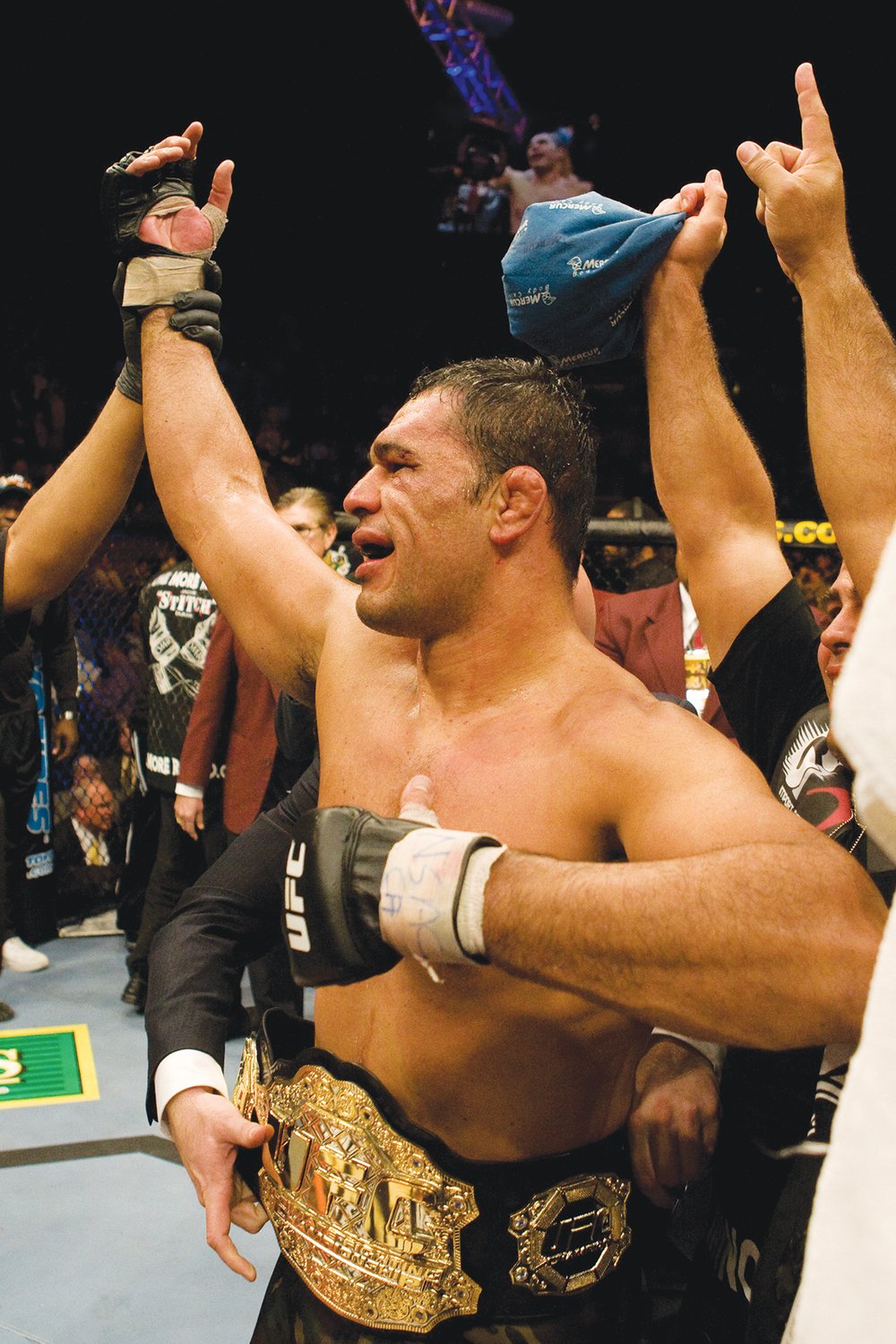
THE PATH OF THE UFC HEAVYWEIGHT CROWN
Mark Coleman wins heavyweight title by defeating Dan Severn, UFC 12, February 7th, 1997.
Maurice Smith wins heavyweight title by defeating Mark Coleman, UFC 14, July 27th 1997. He defends it once against David ‘Tank’ Abbott on UFC 15, October 17th 1997.
Randy Couture wins heavyweight title by defeating Maurice Smith, UFC Japan, December 21st 1997. Couture was stripped of the title in January 1998 due to a contract dispute.
Bas Rutten wins heavyweight title by defeating Kevin Randleman, UFC 20, May 7th, 1999. The title was vacated in June 1999 when Rutten left the heavyweight division.
Kevin Randleman wins heavyweight title by defeating Pete Williams, UFC 23, November 19th 1999. He defends it once against Pedro Rizzo on UFC 26, June 9th, 2000.
Randy Couture wins heavyweight title by defeating Kevin Randleman, UFC 28, November 17th, 2000. He defends it twice against Pedro Rizzo, on UFC 31, May 4th 2001 and UFC 34, November 2nd, 2001.
Josh Barnett wins heavyweight title by defeating Randy Couture, UFC 36, March 22nd 2002. Barnett was immediately stripped of the title in March 2002 after testing positive for anabolic steroids in a post-fight drug test.
Ricco Rodriguez wins heavyweight title by defeating Randy Couture, UFC 39, September 27th 2002.
Tim Sylvia wins heavyweight title by defeating Ricco Rodriguez, UFC 41, February 28th 2003. He defends it once against Gan McGee on UFC 44, September 26th 2003.
Sylvia relinquished his title in September 2003 after testing positive for anabolic steroids in a post-fight drug test.
Frank Mir wins heavyweight title by defeating Tim Sylvia, UFC 48, June 19th 2004.
Andrei Arlovski wins interim heavyweight title by defeating def Tim Sylvia, UFC 51, February 5th 2005. He defends it twice against Justin Eilers on UFC 53, June 4th 2005 and Paul Buentello on UFC 55, October 7th 2005. Mir was stripped of the title in August 2005 after being unable to defend due to an injury. Arlovski was promoted to undisputed champion on August 12th 2005.
Tim Sylvia wins heavyweight title by defeating Andrei Arlovski, UFC 59, April 15th 2006. He defends it twice, against Andrei Arlovski on UFC 61, July 8th 2006 and Jeff Monson on UFC 65, November 18th 2006.
Randy Couture wins heavyweight title by defeating Tim Sylvia on UFC 68, March 3rd 2007. He defends it once against Gabriel Gonzaga on UFC 74, August 25th 2007.
Antônio Rodrigo Nogueira wins interim heavyweight title by defeating Tim Sylvia, UFC 81, February 2nd 2008.


